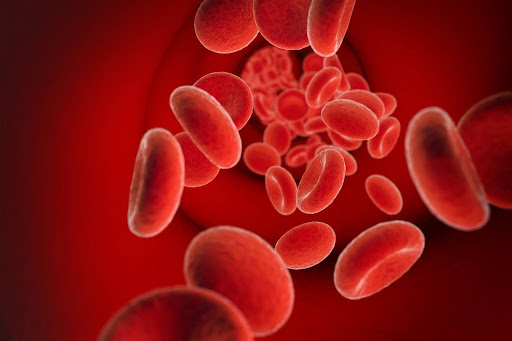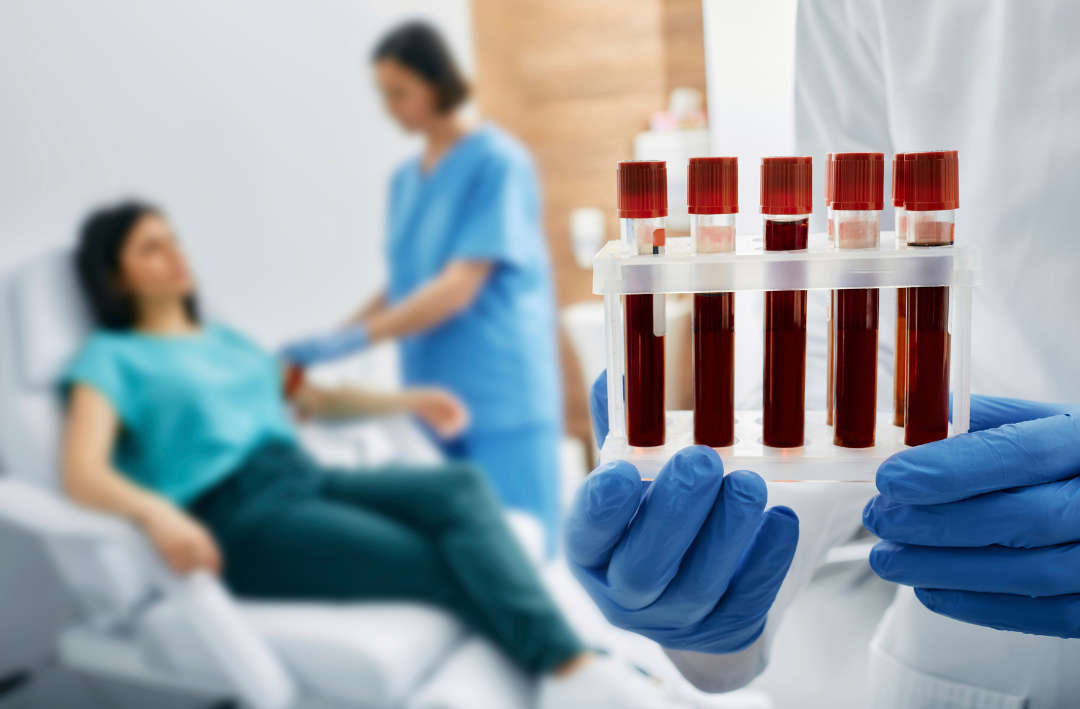Iron Infusion in Singapore

What Is an Iron Infusion?
An iron infusion is a medical procedure where iron is injected directly into your bloodstream through a vein. It is an effective treatment for iron deficiency designed to replenish the body's iron stores. This therapy helps elevate iron levels, thereby restoring healthy bodily functions and improving overall well-being. According to a study conducted by SingHealth, about 50% of women in Singapore may be prone to iron deficiency.
At Nuffield Medical, we understand that iron deficiency brings challenges that limit you in doing your daily routine. We are dedicated to providing personalised infusion treatments to help you regain your vitality and improve your quality of life. If you are among them, know that you're not alone and there are effective treatments available.

Why Is Iron Important?
Iron is an essential mineral your body needs to function properly. It’s a key player in producing haemoglobin, a protein in red blood cells that carries oxygen throughout your body. Without enough iron, your body can’t produce enough healthy oxygen-carrying red blood cells, leading to feelings of fatigue and weakness.
Your muscles also need iron to store and use oxygen effectively, which helps you maintain your energy levels and perform daily activities. When your iron levels drop too low, you may feel tired and find it challenging to keep up with your routine.
Iron is essential for maintaining healthy iron stores in your body. These stores act as a reserve, ensuring you have iron available when you need it most. Your body carefully regulates iron levels to prevent deficiency or excess, aiming to keep you feeling your best.
Iron is also needed for numerous other metabolic processes in the body and therefore iron deficiency can have a wide variety of effects on your quality of life.
Iron Infusion Benefits
Living with low iron levels can be tough, but iron infusions can offer significant relief and improve your quality of life. Here’s how they can help:
- Increase Iron Levels: Iron infusions provide a quick boost of iron directly into your bloodstream, replenishing your iron stores much faster than oral supplements. This is particularly beneficial for those suffering from severe iron deficiency, as it allows for rapid improvement in iron levels. Iron infusions also mitigate the side effects of taking oral iron, which can cause constipation, black stools, and gastric discomfort.
- Increase Energy Levels: Feeling constantly tired can limit you from enjoying daily activities. As your iron levels rise, you may notice an increase in energy, helping you feel less tired and more capable of handling daily tasks.
- Improve Oxygen Delivery: Low iron levels can impair the production of red blood cells, reducing oxygen delivery throughout your body. Iron infusions enhance erythropoiesis (the production of red blood cells) and improve oxygen transport, which can enhance your overall physical well-being. Monitoring your blood cell count is an essential part of the post-infusion process to ensure the treatment's effectiveness.
- Clearer Thinking: With better oxygen delivery to your brain, IV iron infusions can help improve mental clarity and cognitive function, making it easier to think clearly and stay focused.
- Boost Immune System: Frequent illnesses can be a sign of low iron levels. Iron is crucial for a strong immune system and an infusion can strengthen your body’s defences, helping you stay healthier.
- Reduce Hair Loss: Experiencing hair loss due to iron deficiency can affect your self-esteem. Iron infusions can help reduce or stop hair loss, promoting healthier hair growth and improving your confidence.
- Treat insomnia and restlessness: Iron replacement can help reduce restlessness, which can be a cause of insomnia for those suffering from iron deficiency.
- Mood stability and happiness: Iron deficiency is a known cause of irritability and mood swings. This can not only affect the individual suffering from iron deficiency, but also the caregivers and family members.
- Lessen Digestive Issues: Oral iron supplements often cause constipation or stomach upset. Iron infusions bypass the digestive system altogether, reducing these uncomfortable side effects and providing a more comfortable treatment option.
Ready to discover the transformative benefits of an IV iron infusion? Schedule your consultation with Nuffield Medical and say hello to a healthier, more energetic you!
Iron Deficiency Symptoms
Iron deficiency can affect your daily life, but recognising the symptoms early can help you get the right treatment. Here are common signs to look out for:
- Fatigue: Constant tiredness can make it hard to get through the day. For instance, you might find yourself needing naps or feeling exhausted by mid-afternoon.
- Hair Loss: You may begin to notice your hair thinning or falling out more than usual. This can be particularly evident when you see an increased amount of hair in your brush or shower drain
- Infections: If iron deficiency anaemia is left untreated, it can make you more susceptible to illness and infection, as a lack of iron affects the body’s natural defence system (the immune system).
- Low Moods: Iron helps your blood deliver oxygen around the body, and low moods or feeling lethargic may be a sign that your brain is not getting enough oxygen.
- Poor concentration/focus: Although it may not directly lead to brain fog, iron deficiency can hinder your ability to concentrate because of insufficient oxygen reaching the brain.
- Weakness: Everyday tasks might feel more challenging due to a general sense of physical weakness. This can make even simple activities, like climbing stairs or carrying groceries, seem overwhelmingly difficult.
- Pale skin: Your skin may appear unusually pale or dull, and friends or family might comment that you look unwell or ask if you’re feeling okay.
- Shortness of breath: Even simple tasks such as climbing stairs or walking short distances can leave you breathless and gasping for air, making daily activities more difficult.
- Headaches: Frequent headaches that don’t respond well to regular pain relief can be a sign of low iron levels, causing discomfort and affecting your focus and productivity.
- Dizziness: Standing up quickly might make you feel lightheaded or unsteady, increasing the risk of falls and making it hard to go about your day safely.
- Heart palpitations: You might notice your heart racing or feeling like it’s pounding, even when you’re at rest. Imaging sitting down yet feeling like you’re running a mile.
- Brittle nails: Your nails may become weak and prone to breaking or splitting easily, which can be frustrating and sometimes painful.
- Cold hands and feet: Poor circulation due to low iron levels can make your hands and feet feel cold, even in warm weather, leading to constant discomfort.
- Unusual cravings: Experiencing cravings for non-food items like ice or dirt (a condition known as pica) can be a peculiar but telltale sign of iron deficiency.
- Hair loss: You may begin to notice your hair thinning or falling out more than usual. This can be particularly evident when you see an increased amount of hair in your brush or shower drain.
Don’t let these symptoms lead to more alarming conditions, take action right away. At Nuffield Medical, we understand how challenging living with iron deficiency can be. Schedule a consultation with us by filling out our booking form or calling +6566363083 to experience compassionate and quality care.
Types of Iron Infusions
Iron infusions are available in various forms, each designed to meet specific medical needs and conditions. In Singapore, the most commonly used types include:
- Iron polymaltose: This form is often used for patients who need a gradual replenishment of iron stores.
- Iron carboxymaltose: Recommended for iron replacement to treat iron deficiency anaemia (IDA) in adults who cannot tolerate or do not respond adequately to oral iron.
- Iron sucrose: Frequently used as a source of iron in patients with iron deficiency anaemia with chronic kidney disease
- Iron dextran: Iron dextran, another important type of IV iron therapy, is used for patients who do not respond well to other forms of iron therapy. It is particularly efficient in treating severe cases of iron shortage and is frequently chosen when other types have proven ineffective or have caused significant side effects.
These infusions are administered via a drip into your vein. Your doctor will select the best option based on your individual health needs and iron levels.
You might also come across several well-known brands:
- Feraheme (ferumoxytol): This is a treatment often used for adults who cannot tolerate oral iron supplements or have not responded well to them.
- Monoferric (ferric derisomaltose): Another effective option for replenishing iron stores, it is designed for patients who require a single-dose treatment, which can be particularly convenient.
- Venofer (iron sucrose): Effectively replenishes iron levels, helps alleviate symptoms of fatigue and weakness and is commonly used for individuals with kidney disease.
- Ferrlecit (sodium ferric gluconate): This option is often used in patients who may have difficulty with oral iron due to gastrointestinal issues or other health complications.
It's important to note that each type of IV iron infusion has specific uses tailored to different patient needs.
The duration of your infusion can vary, typically lasting anywhere from 15 minutes to 30 minutes, depending on the specific type of iron being administered. Some patients may only require a single session, while others might need multiple treatments to achieve optimal results.
You don’t have to face iron deficiency alone—support and relief are just an appointment away! Book a consultation with Nuffield Medical today and we’ll discuss what’s best for you.
Iron Deficiency Causes
Iron infusions are a fast way to top up your iron levels, especially when other methods, such as oral supplements, aren’t providing the relief you need. They can be particularly beneficial if you have difficulty taking iron tablets or if those tablets aren’t sufficiently raising your iron levels.
Some health conditions can make it difficult for your body to absorb iron from food or pills. These include:
- Mennorhagia and other gynaecological issues: The main cause of iron deficiency can be due to heavy menstrual period due to a variety of gynaecological issues. It can also be present in women who tend to have heavier period without any particular underlying disorder. It is important to recognise this and get screened for iron deficiency, which may be a hidden cause for a variety of symptoms, thereby significantly impacting women's health and their quality of life.
- Inflammatory bowel disease: This condition can cause inflammation in the digestive tract, which often leads to difficulties in absorbing essential nutrients, including iron.
- Vegetarian diet: Vegetarians have a higher risk for developing iron depletion and iron deficiency because the body doesn't absorb iron from plant-based sources as readily as it does from meat.
- Endurance Exercise: Exercise-induced anaemia, commonly referred to as sports anaemia, frequently affects individuals engaged in intense training, such as powerlifters and endurance athletes. This condition can result from iron depletion due to factors like excessive sweating, gastrointestinal bleeding, and hemolysis, which is the destruction of red blood cells.
- Regular Blood Donation: Frequent blood donation can result in iron deficiency because each donation depletes the body of iron-rich red blood cells. Specifically, each blood donation typically results in a loss of approximately 220-250 mg of iron.
- Hemorrhoids (Piles): Hemorrhoids, or piles, can lead to iron deficiency due to chronic blood loss. When hemorrhoids bleed, even in small amounts, it can result in a gradual decrease in the body's iron levels.
- Celiac disease: This autoimmune disorder results in damage to the small intestine when gluten is consumed, impairing nutrient absorption and often leading to deficiencies in iron.
- Stomach Acids: Stomach acids play a crucial role in iron absorption, and insufficient stomach acid can lead to iron deficiency.
- Chronic disease: Iron deficiency is frequently seen in individuals with chronic conditions, including heart failure (HF), chronic kidney disease (CKD), inflammatory bowel disease (IBD), and cancer.
- Chronic kidney disease (CKD): Individuals with CKD, especially those on dialysis, frequently require iron infusions. Dialysis can cause substantial blood loss and decreased iron absorption, complicating the maintenance of appropriate iron levels. Iron infusions help to control anemia, which is usually associated with renal illness, by directly boosting the iron available for new red blood cell synthesis, reducing fatigue and other issues caused by iron deficiency in these patients.
If you’re pregnant, your doctor may recommend an iron infusion to prevent problems for you and your baby. Low iron levels during pregnancy can lead to several serious complications.
Cancer patients often require iron infusions too as part of their treatment plan. Many cancer therapies, such as chemotherapy, can lead to anaemia, resulting in symptoms like fatigue and weakness.
There are times when you may experience significant blood loss. This can occur due to several common situations, including:
- Heavy periods: Many women face heavy menstrual bleeding, this condition can result in substantial blood loss each month, leading to iron deficiency and symptoms such as fatigue, weakness, and dizziness.
- Stomach ulcers: These open sores in the lining of the stomach can cause chronic bleeding, often without obvious symptoms. The slow loss of blood from ulcers can gradually deplete your iron reserves.
- Certain surgeries: Surgical procedures can lead to significant blood loss, especially those involving major organs or extensive tissue removal. Following surgery, your body may require additional iron to aid in recovery.
In situations of significant blood loss or when iron levels are critically low, an iron infusion can quickly replenish your iron stores more effectively than oral supplements.
Before proceeding with an iron infusion, blood tests will be conducted to assess your current iron levels and overall health. Your doctor will also review your medical history and any existing health conditions to ensure that the treatment is safe and tailored to your needs. Nuffield Medical offers health screenings to help identify underlying medical conditions you may not be aware of, even when you feel generally well and healthy. Contact our team to get started.

Iron Infusion Procedure
Before the Procedure
Before your iron infusion, your doctor will do tests to determine your current iron levels. This evaluation ensures that the iron infusion is designed to increase your iron levels, resulting in a personalised treatment plan based on your unique requirements. On the day of your treatment, keep these tips in mind:
- Take Your Usual Medications: Continue with any prescribed medications unless your doctor advises otherwise. Maintaining your routine can help you feel more at ease.
- Wear Comfortable, Loose-Fitting Clothes: Dressing comfortably can make the experience more pleasant. Loose clothing will allow easy access to your arm for the infusion and help you relax during the procedure.
- No Need to Fast: Unlike some medical procedures, there is no requirement to fast before IV iron therapy. This means you can eat as normal, which can contribute to your overall comfort.
If you're feeling anxious about the infusion, don't hesitate to discuss your concerns with your doctor beforehand. They can offer reassurance and suggest calming techniques to help ease your mind during the treatment.
During the Procedure
The iron infusion itself is a straightforward and well-monitored process designed to ensure your comfort and safety: At Nuffield Medical, your iron infusion is a straightforward and supportive experience. A nurse will gently insert an IV to administer the iron solution, vital for boosting your energy and overall health. Throughout the 15-30 minute procedure, our caring team will monitor you for any side effects, ensuring your comfort and safety. Feel free to read, listen to music, or watch a movie while you relax. We're dedicated to prioritising your well-being and strive to create a comforting environment as you focus on your recovery.
After the Procedure
After your iron infusion at Nuffield Medical, you can go home right away to relax. Some may feel fatigued, so it's important to rest. For any unusual symptoms, contact your doctor to discuss immediate solutions. Your iron levels should improve within a dew days to a week, and a follow-up blood test will be scheduled to check your progress and assess the need for more infusions. This follow up includes checking your blood cell count, which is critical for determining how well the infusion repaired the anaemia and restored healthy red blood cell production. Monitoring blood cell count is critical to ensuring that your body is using iron efficiently to make enough healthy red blood cells.

Why Choose Nuffield Medical?
Nuffield Medical is dedicated to helping you regain your energy. Here’s why our personalised approach to IV iron infusion treatment makes us the right choice for your journey to better health:
- Comforting Environment: Our Nuffield Medical Siglap clinic has a 4.5-star Google rating, while Nuffield Medical Orchard is rated 4.4 by Google, reflecting our commitment to friendly and compassionate care. Our staff is dedicated to ensuring your comfort, taking the time to explain the procedure and answer any questions you may have, so you feel at ease throughout the process.
- Specialised Care: Our team is composed of specialists from various medical fields. Their meticulous and compassionate approach ensures your comfort and instils trust that you receive care from professionals with a wealth of expertise.
- Fast and Effective Results: Our modern IV iron preparations allow for quick iron repletion, often requiring just one or two doses. Many patients experience significant improvements shortly after their infusion, with some gaining up to a year’s worth of iron in just one session.
Don’t let iron deficiency keep you from living your best life. Schedule your consultation with Nuffield Medical and achieve a healthier version of yourself. Video consultation is also available for added convenience.
Book an Appointment Now!
It’s essential to diagnose and treat iron deficiency promptly to prevent these complications and improve overall health and well-being. If you suspect you have iron deficiency or are experiencing symptoms, consult a healthcare professional today
FAQs
Is it worth getting an iron infusion?
Absolutely! If you have severe iron deficiency that hasn’t improved with oral supplements, iron infusions provide a quick boost, helping to alleviate symptoms like fatigue and weakness.
What does an iron infusion do to your body?
An iron infusion raises the level of iron in your blood. A doctor might suggest several infusions based on your iron levels and the underlying cause of your deficiency.
Is an iron infusion painful?
No, iron infusions are generally painless. You might feel a slight pinch when the needle is inserted, but the infusion itself should not cause discomfort.
How long to recover from an iron infusion?
While the amount of time to recover varies per individual, most people feel better in just a few days. Mild side effects like headache or nausea may occur but typically resolve within 24 hours.
How long does it take to see the benefits of an iron infusion?
You may feel better in a few days but it can take 2-3 weeks to see the full benefit of increased iron levels.
How many sessions of iron infusion do you need?
The number of sessions required varies based on your specific iron levels and overall health. While some individuals may benefit from just one session, others might need several treatments over a few weeks to achieve the results they're aiming for.
How long is an iron infusion?
An iron infusion usually takes between 15 to 30 minutes. You will be monitored during the procedure and for about 15 minutes afterward to ensure your safety.
Can I get an iron infusion while pregnant?
Yes, iron infusions can be administered during pregnancy if oral supplements are ineffective. They are considered safe after the first trimester because by this time, the foetus has stronger protective mechanisms, reducing the risk of adverse effects from iron infusions..
Why am I so tired after an iron infusion?
Fatigue is common as your body adjusts to the sudden increase in iron levels. This tiredness usually subsides within a few days as your body adapts.
Medical References
Auerbach, Michael, and Harold Ballard. “Clinical Use of Intravenous Iron: Administration, Efficacy, and Safety.” Hematology, vol. 2010, no. 1, Dec. 2010, pp. 338–47, doi:10.1182/asheducation-2010.1.338.
